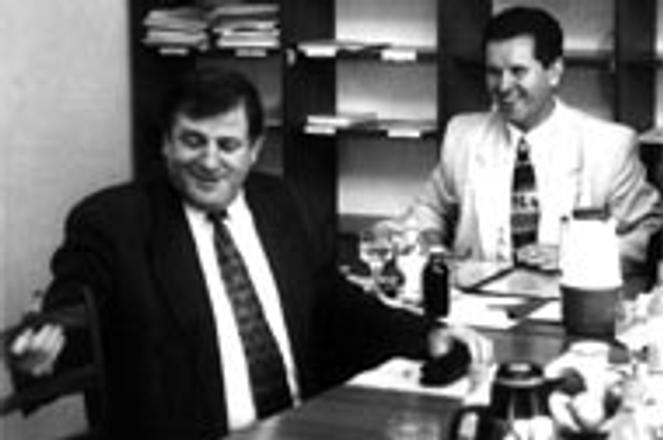Still a seat at the table. Premier Vladimír Mečiar will be looking for coalition mates following September national elections. SDĽ leader Jozef Migaš (right) has declared he's not interested.Jozef Baran
The Party of the Democratic Left (SDĽ) is an alliance of reformed communists which has often been accused of flirting with Vladimír Mečiar's ruling HZDS party, but which in fact remains the only Slovak party in the current Parliament that has never formed a government with Mečiar. At their April 25-26 congress, SDĽ deputies decided they wanted to keep it that way.
In a resolution adopted at the end of the congress, held in the central Slovak town of Zvolen, the party stated it would not become the "savior" of the current governing coalition.
"The SDĽ has made it very clear that when election results are announced, it will not forget the wrongdoings of the current government," commented MP Peter Weiss, SDĽ Vice Chairman. "The SDĽ will form a government only with those political parties with which it can agree on a political program, and with which it can co-operate in the interests of Slovakia. The ruling coalition parties have not shown that they [care for] such interests."
Holding a grudge
"The SDĽ will not be their savior, that's for sure," Weiss continued. "If somebody in the HZDS hoped that the SDĽ would be divided on this issue, he has to be very disappointed."
"We believe that a sense of moral and political responsibility has to be required of the current coalition parties," seconded another party Vice-Chairman, Ľubomír Fogaš.
The conservative wing of the opposition spectrum welcomed the party's commitment. "I consider this to be a great statement from the SDĽ," said KDH Vice-Chairman Ján Figeľ. "Society cannot have a happy future if it cannot responsibly look back and deal with wrongdoings in accordance with the laws of this country."
The SDĽ still holds a grudge against the Association of Slovak Workers (ZRS), the smaller of Mečiar's two coalition satellites, which lured away many SDĽ votes before the 1994 elections. "The ZRS was abused by its leader [Ján Ľupták] to create a new class of wealthy [citizens], and it bears a great responsibility for establishing an economically divided society," Weiss said, adding that his party will strive to win its former voters back.
"I will consider it a success, after the new [left-oriented Party of Civil Understanding (SOP)] has been formed, if we are able to gain the same support we had in 1992, which was 14 percent. That would be a great start," said Weiss.
Government ambitions
The SDĽ congress placed 21 candidates on its election ticket, which apart from most of the current MPs features two unsuccessful Presidential candidates - academic Juraj Hraško, premier in the party's shadow cabinet, and author Ladislav Ballek. The congress also approved eight campaign leaders for various regions, and nominated party chairman Jozef Migaš as their main leader if the government's plan to create a single election district in Slovakia passes.
Even if the election law proposal does not pass, the party intends to speak with one voice, and aims to avoid any false tones in its campaign orchestration. "The eight leaders...have to agree among themselves, and they have to discuss election issues together, so that there are no differences of opinion in their public pronouncements," Fogaš said.
SDĽ Vice-Chairwoman Brigita Schmögnerová said that if the objective of unanimity is met, the party can be confident of winning government seats after September. "We realize that the new government will have to be a coalition government," she said. As a part of such a government, she continued, the SDĽ would focus mostly on wrestling down the unemployment rate, creating new housing and addressing the social problems of young people.
Another crucial issue in SDĽ's policy, Schmögnerová continued, was not only to attract foreign investors, but also to strive to distribute investment resources more evenly across the country. Last week, the daily Sme reported that of Slovakia's 281.3 billion Sk ($8.1 billion) in total investment, as much as 56% was invested in the Bratislava region alone.
"There is a great need for foreign investment," Schmögnerová conceded. "[But] we do not want to attract foreign investors to Bratislava and Košice only, but to other regions as well."
Schmögnerová was confident of attracting the necessary resources, noting that the re-establishment of a fully democratic regime in the country was the main precondition. "The low amount of foreign investment is a reflection of the unpleasant political situation," she said, adding that a democratic government would create the atmosphere foreign investors seek.


